英语合同的特点和翻译
- 格式:docx
- 大小:34.21 KB
- 文档页数:9
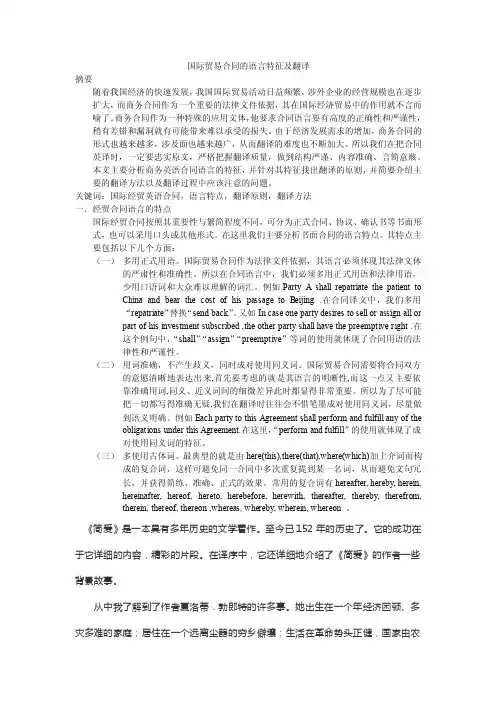
国际贸易合同的语言特征及翻译摘要随着我国经济的快速发展,我国国际贸易活动日益频繁,涉外企业的经营规模也在逐步扩大,而商务合同作为一个重要的法律文件依据,其在国际经济贸易中的作用就不言而喻了。
商务合同作为一种特殊的应用文体,他要求合同语言要有高度的正确性和严谨性,稍有差错和漏洞就有可能带来难以承受的损失。
由于经济发展需求的增加,商务合同的形式也越来越多,涉及面也越来越广,从而翻译的难度也不断加大。
所以我们在把合同英译时,一定要忠实原文,严格把握翻译质量,做到结构严谨、内容准确、言简意赅。
本文主要分析商务英语合同语言的特征,并针对其特征找出翻译的原则,并简要介绍主要的翻译方法以及翻译过程中应该注意的问题。
关键词:国际经贸英语合同,语言特点,翻译原则,翻译方法一.经贸合同语言的特点国际经贸合同按照其重要性与繁简程度不同,可分为正式合同、协议、确认书等书面形式,也可以采用口头或其他形式。
在这里我们主要分析书面合同的语言特点。
其特点主要包括以下几个方面:(一)多用正式用语。
国际贸易合同作为法律文件依据,其语言必须体现其法律文体的严肃性和准确性。
所以在合同语言中,我们必须多用正式用语和法律用语,少用口语词和大众难以理解的词汇。
例如Party A shall repatriate the patient toChina and bear the cost of his passage to Beijing .在合同译文中,我们多用“repatriate”替换“send back”。
又如In case one party desires to sell or assign all orpart of his investment subscribed ,the other party shall have the preemptive right .在这个例句中,“shall”“assign”“preemptive”等词的使用就体现了合同用语的法律性和严谨性。
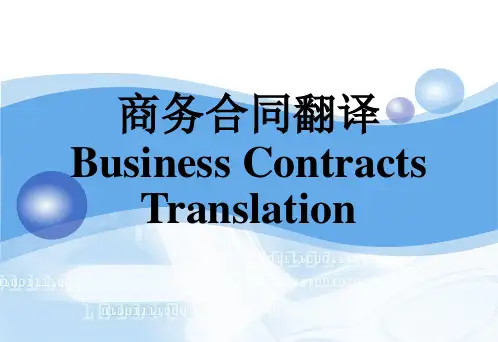

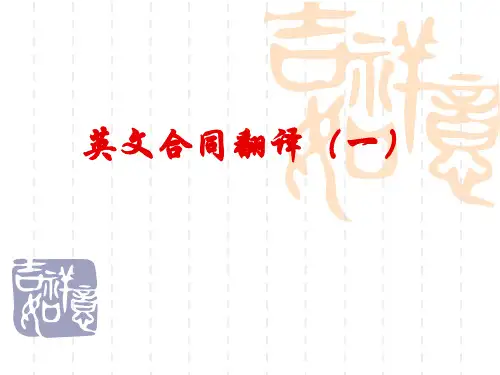
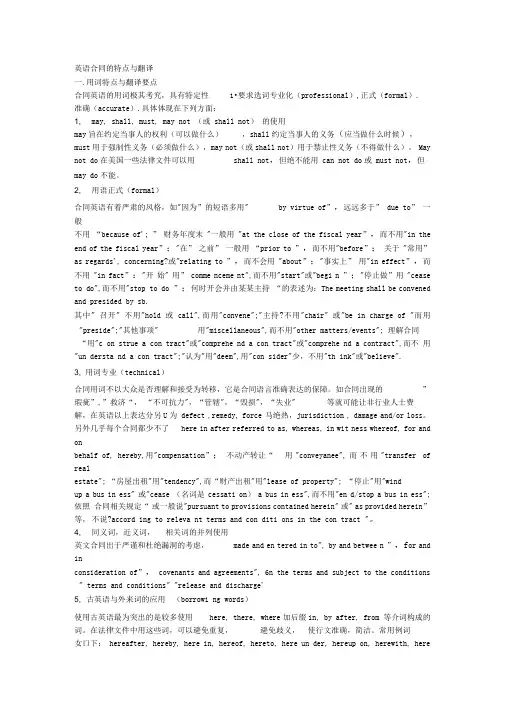
英语合同的特点与翻译一.用词特点与翻译要点合同英语的用词极其考究,具有特定性1•要求选词专业化(professional),正式(formal).准确(accurate).具体体现在下列方面:1, may, shall, must, may not (或 shall not)的使用may旨在约定当事人的权利(可以做什么),shall约定当事人的义务(应当做什么时候),must用于强制性义务(必须做什么),may not(或shall not)用于禁止性义务(不得做什么)。
May not do在美国一些法律文件可以用shall not,但绝不能用 can not do或 must not,但may do不能。
2, 用语正式(formal)合同英语有着严肃的风格,如"因为”的短语多用" by virtue of”,远远多于” due to” 一般不用“because of'; ” 财务年度末 "一般用 "at the close of the fiscal year”,而不用"in the end of the fiscal year”;"在” 之前” 一般用“prior to ”,而不用"before”;关于 "常用” as regards', concerning?或"relating to ”,而不会用 "about”;"事实上” 用"in effect”,而不用 "in fact”:"开始" 用” comme nceme nt",而不用"start"或"begi n ”;"停止做”用 "cease to do",而不用"stop to do ”;何时开会并由某某主持“的表述为:The meeting shall be convened and presided by sb.其中" 召开" 不用"hold 或 call",而用"convene";"主持?不用"chair" 或"be in charge of "而用"preside";"其他事项" 用"miscellaneous",而不用"other matters/events"; 理解合同“用"c on strue a con tract"或"comprehe nd a con tract"或"comprehe nd a contract",而不用"un dersta nd a con tract";"认为"用"deem",用"con sider"少,不用"th ink"或"believe".3, 用词专业(technical)合同用词不以大众是否理解和接受为转移,它是合同语言准确表达的保障。
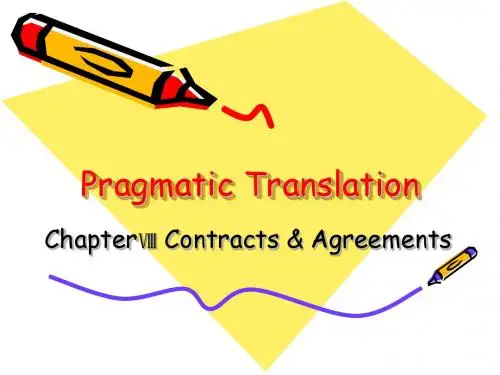
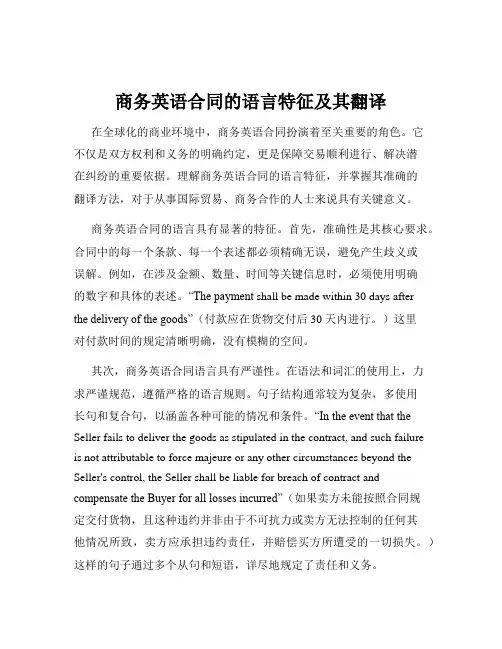
商务英语合同的语言特征及其翻译在全球化的商业环境中,商务英语合同扮演着至关重要的角色。
它不仅是双方权利和义务的明确约定,更是保障交易顺利进行、解决潜在纠纷的重要依据。
理解商务英语合同的语言特征,并掌握其准确的翻译方法,对于从事国际贸易、商务合作的人士来说具有关键意义。
商务英语合同的语言具有显著的特征。
首先,准确性是其核心要求。
合同中的每一个条款、每一个表述都必须精确无误,避免产生歧义或误解。
例如,在涉及金额、数量、时间等关键信息时,必须使用明确的数字和具体的表述。
“The payment shall be made within 30 days afterthe delivery of the goods”(付款应在货物交付后 30 天内进行。
)这里对付款时间的规定清晰明确,没有模糊的空间。
其次,商务英语合同语言具有严谨性。
在语法和词汇的使用上,力求严谨规范,遵循严格的语言规则。
句子结构通常较为复杂,多使用长句和复合句,以涵盖各种可能的情况和条件。
“In the event that the Seller fails to deliver the goods as stipulated in the contract, and such failure is not attributable to force majeure or any other circumstances beyond the Seller's control, the Seller shall be liable for breach of contract and compensate the Buyer for all losses incurred”(如果卖方未能按照合同规定交付货物,且这种违约并非由于不可抗力或卖方无法控制的任何其他情况所致,卖方应承担违约责任,并赔偿买方所遭受的一切损失。
)这样的句子通过多个从句和短语,详尽地规定了责任和义务。
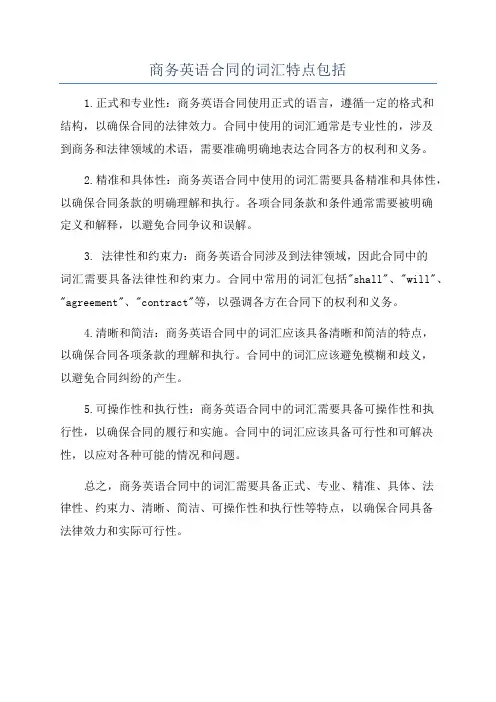
商务英语合同的词汇特点包括
1.正式和专业性:商务英语合同使用正式的语言,遵循一定的格式和
结构,以确保合同的法律效力。
合同中使用的词汇通常是专业性的,涉及
到商务和法律领域的术语,需要准确明确地表达合同各方的权利和义务。
2.精准和具体性:商务英语合同中使用的词汇需要具备精准和具体性,以确保合同条款的明确理解和执行。
各项合同条款和条件通常需要被明确
定义和解释,以避免合同争议和误解。
3. 法律性和约束力:商务英语合同涉及到法律领域,因此合同中的
词汇需要具备法律性和约束力。
合同中常用的词汇包括"shall"、"will"、"agreement"、"contract"等,以强调各方在合同下的权利和义务。
4.清晰和简洁:商务英语合同中的词汇应该具备清晰和简洁的特点,
以确保合同各项条款的理解和执行。
合同中的词汇应该避免模糊和歧义,
以避免合同纠纷的产生。
5.可操作性和执行性:商务英语合同中的词汇需要具备可操作性和执
行性,以确保合同的履行和实施。
合同中的词汇应该具备可行性和可解决性,以应对各种可能的情况和问题。
总之,商务英语合同中的词汇需要具备正式、专业、精准、具体、法
律性、约束力、清晰、简洁、可操作性和执行性等特点,以确保合同具备
法律效力和实际可行性。
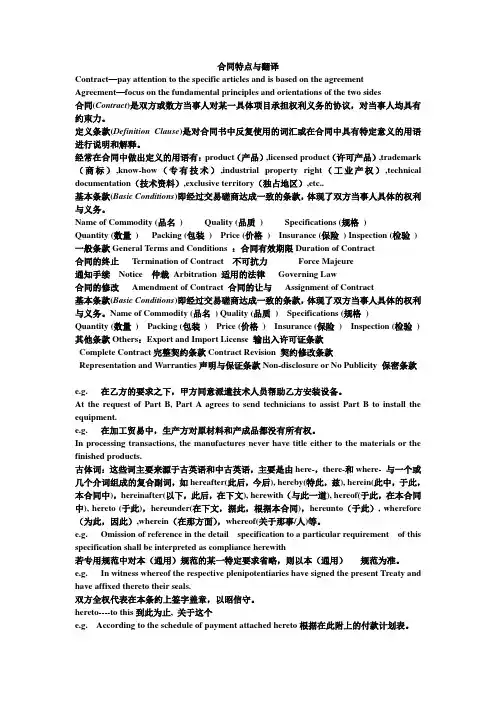
合同特点与翻译Contract—pay attention to the specific articles and is based on the agreement Agreement—focus on the fundamental principles and orientations of the two sides合同(Contract)是双方或数方当事人对某一具体项目承担权利义务的协议,对当事人均具有约束力。
定义条款(Definition Clause)是对合同书中反复使用的词汇或在合同中具有特定意义的用语进行说明和解释。
经常在合同中做出定义的用语有:product(产品),licensed product(许可产品),trademark (商标),know-how(专有技术),industrial property right(工业产权),technical documentation(技术资料),exclusive territory(独占地区),etc..基本条款(Basic Conditions)即经过交易磋商达成一致的条款,体现了双方当事人具体的权利与义务。
Name of Commodity (品名) Quality (品质) Specifications (规格)Quantity (数量) Packing (包装) Price (价格) Insurance (保险) Inspection (检验) 一般条款General Terms and Conditions :合同有效期限Duration of Contract合同的终止Termination of Contract 不可抗力Force Majeure通知手续Notice 仲裁Arbitration 适用的法律Governing Law合同的修改Amendment of Contract 合同的让与Assignment of Contract基本条款(Basic Conditions)即经过交易磋商达成一致的条款,体现了双方当事人具体的权利与义务。
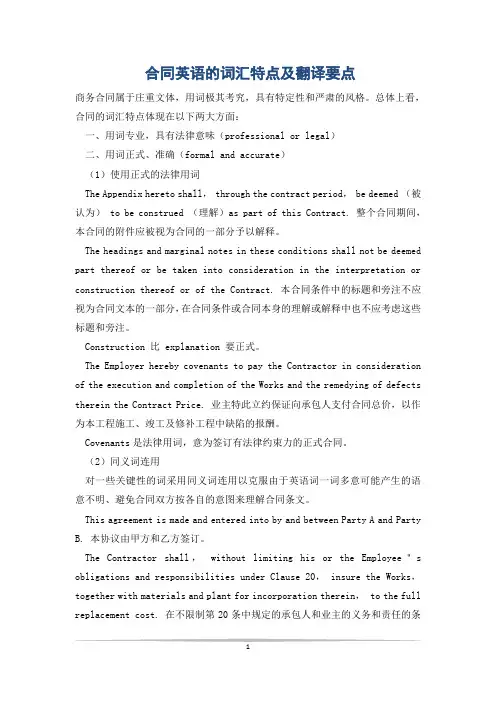
合同英语的词汇特点及翻译要点商务合同属于庄重文体,用词极其考究,具有特定性和严肃的风格。
总体上看,合同的词汇特点体现在以下两大方面:一、用词专业,具有法律意味(professional or legal)二、用词正式、准确(formal and accurate)(1)使用正式的法律用词The Appendix hereto shall, through the contract period, be deemed (被认为) to be construed (理解)as part of this Contract. 整个合同期间,本合同的附件应被视为合同的一部分予以解释。
The headings and marginal notes in these conditions shall not be deemed part thereof or be taken into consideration in the interpretation or construction thereof or of the Contract. 本合同条件中的标题和旁注不应视为合同文本的一部分,在合同条件或合同本身的理解或解释中也不应考虑这些标题和旁注。
Construction 比 explanation 要正式。
The Employer hereby covenants to pay the Contractor in consideration of the execution and completion of the Works and the remedying of defects therein the Contract Price. 业主特此立约保证向承包人支付合同总价,以作为本工程施工、竣工及修补工程中缺陷的报酬。
Covenants是法律用词,意为签订有法律约束力的正式合同。
(2)同义词连用对一些关键性的词采用同义词连用以克服由于英语词一词多意可能产生的语意不明、避免合同双方按各自的意图来理解合同条文。
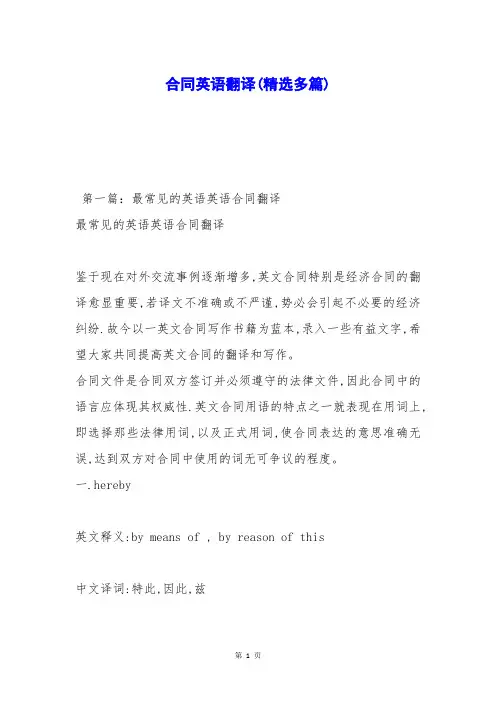
合同英语翻译(精选多篇)第一篇:最常见的英语英语合同翻译最常见的英语英语合同翻译鉴于现在对外交流事例逐渐增多,英文合同特别是经济合同的翻译愈显重要,若译文不准确或不严谨,势必会引起不必要的经济纠纷.故今以一英文合同写作书籍为蓝本,录入一些有益文字,希望大家共同提高英文合同的翻译和写作。
合同文件是合同双方签订并必须遵守的法律文件,因此合同中的语言应体现其权威性.英文合同用语的特点之一就表现在用词上,即选择那些法律用词,以及正式用词,使合同表达的意思准确无误,达到双方对合同中使用的词无可争议的程度。
一.hereby英文释义:by means of , by reason of this中文译词:特此,因此,兹用法:常用于法律文件、合同、协议书等正式文件的开头语;在条款中需要强调时也可用。
语法:一般置于主语后,紧邻主语. 例1:the employer hereby covenants to pay the contractor in consideration of the execution and completion of the works and the remedying of defects therein the contract price or such other sum as may become payable under the provisions of the contract at the time and in the manner prescribed by the contract.参考译文:业主特此立约保证在合同规定的期限内,按合同规定的方式向承包人支付合同价,或合同规定的其它应支付的款项,以作为本工程施工、竣工及修补工程中缺陷的报酬。
注释:(1)hereby: by reason of this 特此(2)covenant: v. make a formal agreement 立约,签订合同、条约; n. legal agreement具有法律约束的正式合同(3)completion of the works: 工程的竣工(4)therein: in the works在本工程中(5)the contract price: 合同总价,指工程的总造价(6)such...as: 关系代词,相当于that, which(7)under: in accordance with 根据,按照(8)the provisions of the contract: terms and conditions of the contract合同条款例2:we hereby certify to the best of our knowledge that the foregoing statement is true and correct and all available information and data have been supplied herein, and that we agree to provide documentary proof upon your request.注释:(1)hereby:特此(2)to the best of our knowledge:as far as we know据我们所知(3)foregoing statement:above-mentioned statement上述声明(4)herein:in this, in the statement在声明中(5)documentary proof:证明文件参考译文:特此证明,据我们所知,上述声明内容真实,正确无误,并提供了全部现有的资料和数据,我们同意,应贵方要求出具证明文件。
英文合同翻译常见词注解
以下是常见的英文合同词汇的中文注解:
1. Agreement - 协议,合同
2. Contract - 合同
3. Party - 当事方,合同方
4. Terms and Conditions - 条款和条件
5. Effective Date - 生效日期
6. Termination - 终止
7. Obligations - 义务,责任
8. Representations and Warranties - 陈述和保证
9. Indemnification - 赔偿,偿付
10. Confidentiality - 保密
11. Governing Law - 管辖法律
12. Force Majeure - 不可抗力
13. Liability - 责任,义务
14. Breach - 违约,违反
15. Jurisdiction - 管辖权
17. Amendment - 修改,变更
18. Counterpart - 对应物,一方副本
19. Prevailing Party - 胜诉方
20. Severability - 可分割性,可分离性
这些词汇在英文合同中经常出现,理解它们的含义可以帮助更好地理解合同的内容和约定。
但是,请注意每个合同可能具有特定的上下文和约定,因此在翻译合同时,确保选取最适合具体情况的中文译词。
合同书翻译英文回答:Contract。
A contract is a legally binding agreement between two or more parties that creates, modifies, or terminates a legal relationship. Contracts can be written or oral, express or implied.Elements of a Contract。
To be valid, a contract must have the following elements:Offer: A proposal by one party to enter into a contract.Acceptance: The agreement by the other party to the terms of the offer.Consideration: Something of value exchanged between the parties, such as money, goods, or services.Capacity: The legal ability of the parties to enter into a contract.Legality: The purpose of the contract must not be illegal.Types of Contracts。
There are many different types of contracts, including:Bilateral contracts: Contracts where both parties make promises to each other.Unilateral contracts: Contracts where one party makes a promise to the other party in exchange for their performance.Executed contracts: Contracts where both parties havefulfilled their obligations.Executory contracts: Contracts where one or both parties have yet to fulfill their obligations.Void contracts: Contracts that are not legally binding due to a lack of one or more essential elements.Voidable contracts: Contracts that are legally binding but can be canceled by one or both parties under certain circumstances.Breach of Contract。
Contract 与Agreement的有无区别在英语中,合同一般称为Contract,协议一般称为Agreement。
何谓“contract”?1999年中国《合同法》第二条对contract定义为:A contact in this Law refers to an agreement establishing, modifying and terminating the civil rights and obligations between subjects of equal foo ting, that is, between natural persons, legal persons or other organizations”。
根据这一定义,合同平等主体之间设立的确定民事权利和义务的协议。
,Steven H. Gifts编著的“Law Dictionary”中将contract 定义为“contract is a promise, or a set of promises, for breach of which the law gives remedy, or the performance of the which the law in some way recognize as a duty.”根据这一定义,合同是一种承诺,违反承诺可以得到法律救助,某种意义上法律将履行该承诺看做是一种补偿。
L.B Curzon 在其编撰的字典“A Dictionary of Law”给contract的定义:“Contract is a legally binding agreement”根据这一定义,合同就是有法律约束力的协议。
综合起来,有一个相同点,就是“Contract is an agreement”,即可将合同说成是“An agreement which binds the parties concerned”或者说合同说成是“An agreement which is enforceable by law”,也可以说:Contracts are promises that the law will enforce。
英文商务合同论文英语商务合同的语言特点与翻译方法English Business Contract: Language Features and Translation MethodsIntroductionEnglish is the dominant language in the field of international business, and thus, English business contracts play a significant role in facilitating global trade. However, understanding and accurately translating these contracts can be complex due to their specific language features. This article explores the unique characteristics of English business contracts and provides insights into effective translation methods.1. Conciseness and PrecisionEnglish business contracts are known for their concise and precise language. The use of clear and specific terminology is crucial to avoid ambiguity and ensure mutual understanding between parties. Sentences are often structured in a straightforward manner, with minimal use of flowery or redundant language. This conciseness enables the contract to convey information efficiently and reduces the chances of misinterpretation.Translation Approach: When translating English business contracts, it is crucial to maintain the same level of conciseness and precision. Translators should prioritize accuracy and ensure that the translated version captures the original intent without introducing any ambiguity. Moreover, maintaining a clear and straightforward style will help ensure that the translated contract is easy to comprehend for all parties involved.2. Legal Terminology and JargonEnglish business contracts involve extensive use of legal terminology and jargon. These terms have specific meanings within the legal context and carry legal consequences. They often require precise translation to preserve their intended legal implications. Examples of such terms include "liability," "indemnification," and "force majeure."Translation Approach: When translating legal terminology and jargon, it is essential to have a deep understanding of both legal systems involved. Translators should conduct thorough research to identify the equivalent terms in the target language that carry the same legal weight. If no direct translation exists, explanatory footnotes or annotations can be added to ensure clarity.3. Conditionality and Precision in ObligationsEnglish business contracts frequently employ conditional language to specify obligations. This enables parties to outline the conditions under which certain obligations must be fulfilled. The use of precise language is crucial to avoid misunderstandings regarding the timing, extent, or triggering events of obligations.Translation Approach: Translating conditional language requires meticulous attention to detail. The translator must ensure that the conditions and obligations are accurately conveyed in the target language, including any specific requirements or triggering events. It is essential to maintain clarity and precision to prevent any misinterpretation by the parties involved.4. Cultural Considerations and International ApplicabilityEnglish business contracts are typically drafted with an international audience in mind. They aim to be culturally neutral and applicable across different jurisdictions. However, certain country-specific laws or cultural practices may need to be considered during the translation process.Translation Approach: Translators should possess a thorough understanding of both the source and target cultures to ensure accurate translation. They must research and consider any legal or cultural nuances that may impact the interpretation of the contract in the target language. Consulting legal experts from the target jurisdiction can also be beneficial to ensure compliance and address any potential conflicts.ConclusionEnglish business contracts have distinct language features that require careful attention during the translation process. Maintaining conciseness, accuracy, and cultural adaptability are essential for ensuring mutual understanding and effective communication between parties. By employing appropriate translation methods and considering legal and cultural nuances, translators can accurately convey the intent and obligations of English business contracts in the target language, thereby facilitating smooth international business transactions.。
编号:_______________本资料为word版本,可以直接编辑和打印,感谢您的下载英语合同的特点和翻译甲方:___________________乙方:___________________日期:___________________一.用词特点与翻译要点合同英语的用词极其考究,具有特定性1.要求选词专业化(professional),正式(formal).准确(accurate).具体体现在下列方面:1, may, shall, must, may not (或shall not)的使用may旨在约定当事人的权利(可以做什么),shall约定当事人的义务(应当做什么时候),must用于强制性义务(必须做什么),may not(或shall not)用于禁止性义务(不得做什么)。
May not do在美国一些法律文件可以用shall not,但绝不能用can not do或must not,但may do不能。
2, 用语正式(formal)合同英语有着严肃的风格,如"因为"的短语多用" by virtue of ",远远多于"due to" 一般不用a because of;"财务年度末 "一般用"at the close of the fiscal year",而不用"in the end of the fiscal year";"在之前"一般用 ................... "prior to ",而不用"before"; 关于 "常用" as regards’,concerning '或"relating to ",而不会用"about";"事实上" 用"in effect",而不用"in fact":"开始" 用"commencement",而不用"start"或"begin";"停止做" 用"cease to do",而不用"stop to do";何时开会并由某某主持"的表述为:The meeting shall be convened and presided by sb.其中"召开" 不用"hold 或call",而用"convene";"主持’不用"chair" 或"be in charge of "而用"preside";"其他事项" 用"miscellaneous",而不用"other matters/events"; 理解合同"用"construe a contract"或"comprehend a contract"或"comprehend a contract",而不用"understand a contract";"认为"用"deem",用"consider"少,不用”think”或"believe".3, 用词专业(technical)合同用词不以大众是否理解和接受为转移,它是合同语言准确表达的保障。
如合同出现的”瑕疵”,”救济“,“不可抗力”,“管辖”,“毁损”,“失业”等就可能让非行业人士费解,在英语以上表达分另U为defect ,remedy, force 马绝热,jurisdiction , damage and/or loss。
另夕卜几乎每个合同者E 少不了hereinafter referred to as, whereas, in witness whereof, for and on behalf of, hereby,用"compensation"; 不动产转让 " 用"conveyance",而不用"transfer of real estate";"房屋出租"用"tendency",而"财产出租"用"lease of property";"停止"用"wind up a business" 或"cease (名词是cessation) a business,而不用"end/stop a business"; 依照合同相关规定“或一般说"pursuant to provisions contained herein"或"as provided herein"等,不说'according to relevant terms and conditions in the contract ”。
4, 同义词,近义词,相关词的并列使用英文合同出于严谨和杜绝漏洞的考虑,made and entered into", by and between", for and inconsideration of", covenants and agreements", 6n the terms and subject to the conditions" terms and conditions" "release and discharge'5, 古英语与外来词的应用(borrowing words)使用古英语最为突出的是较多使用here, there, where加后缀in, by after, from 等介词构成的词。
在法律文件中用这些词,可以避免重复,避免歧义,使行文准确,简洁。
常用例词如下: hereafter, hereby, herein, hereof, hereto, hereunder, hereupon, herewith, hereinbefore,hereinafter, thereafter, thereby, therein, thereinafter, thereinbefore, thereon, thereof, thereunder,thereupon, therewith, whereas, whereby, wherein, whereof, whereon, etc.合同中也会使用一些外来词汇,常用的有拉丁语和法语词汇。
如比例税率:用pro rate taxrate要比proportional tax rate多;从事慈善性服务的律师:pro bono lawyer,不经常用lawyer engaged in charitable legal assistance, 委托代理人多用agent ad litem句法特点与翻译要点商务合同的句法具有结构严谨、句式较长的特点。
句子的状语(从句)和定语(从句)等附加成分很多,且往往位置明显,对主句意义进行解释、限制或补充。
多用陈述句、多用现在时、多用被动语态、多用名词性结构等。
1、长句及其翻译分析合同长句的基本方法是:首先,找出全句的主语、谓语和宾语。
其次,找出句子中所有的谓语结构、非谓语结构、介词短语和从句的引导词,然后在分析从句和短句的功能,即:是否是主语从句、宾语从句、表语从句或状语从句等,以及词、短语和从句之间的关系。
最后,分析句子中是否有固定搭配、插入语等其他成分。
(1) The Buyer may, within 15 days after arrival of the goods at the destination, lodge a claimagainst the seller for short-weight being supported by Inspection Certificate issued by a reputable public surveyor.这是一个简单长句,其主干为The Buyer may ••- lodge a claim •••。
修饰谓语动词的状语有三个,分另U表示时间 ( within 15 days after arrival of the goods at the destination )、方式(being supported by Inspection Certificate issued by a reputable public surveyor ) 和原因(for short-weight )。
诸多状语尽管在原文中位置灵活,然而在译文里,需按照汉语的行文规范适当进行调整:方式状语一般应置于动词之前;其他状语可以灵活处理,如本句中的时间状语可以提前至句首。
译:货物抵达目的港15天内,买方可以凭有信誉的公共检验员出示的检验证明向卖方提出短重索赔。
(2) If a Party breaches any of the representations or warranties given by it in Articles 18.1 orrepeated in 18.2, then in addition to any other remedies available to the other Party under this contract or under Applicable Laws, it shall be indemnify and keep indemnified the other Party and the company against any losses, damages, costs, expenses, liabilities and claims that such Party or the Company may suffer as a result of such breach.本句的主干是it shall be indemnify and keep indemnified •--against- the other Party and thecompany。